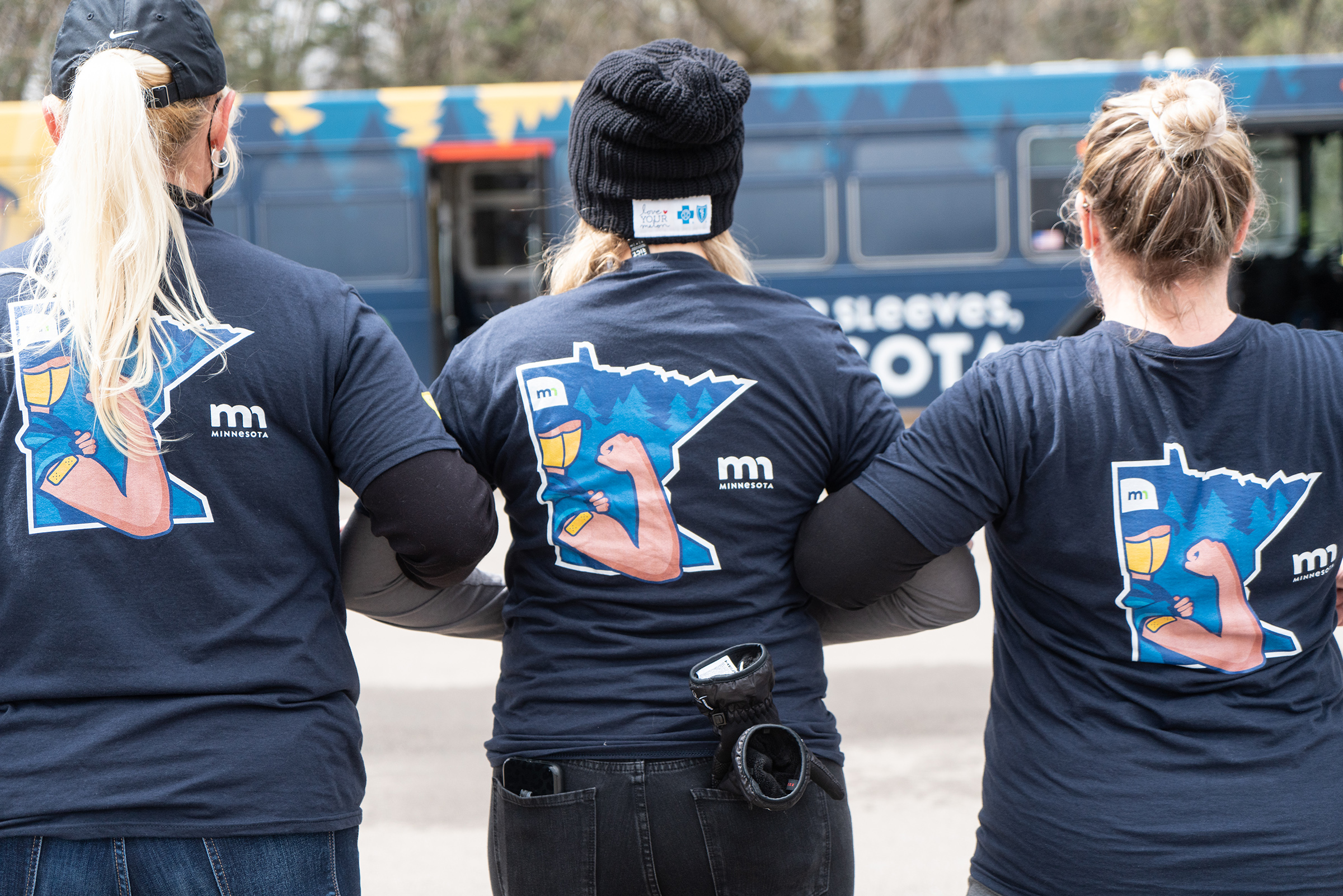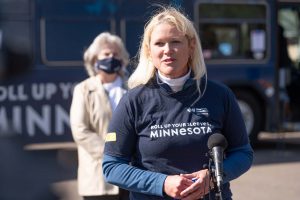Get on the bus! Blue Cross and partners launch mobile vaccination clinics
April 27, 2021Even though everyone 16 and older is eligible to get a COVID-19 vaccine in Minnesota, it doesn’t mean everyone has access to one. There are many reasons for this― among them: lack of transportation, mobility issues, unique health needs, language barriers, experiencing homelessness and wanting to be vaccinated in a more comfortable, trusted space.
Even though Minnesota is leading the way in administering vaccines, there are still disparities in vaccination rates between white and Black, Indigenous and people of color (BIPOC) groups.
To ensure vaccines are being fairly and equitably distributed across the state, Blue Cross and Blue Shield of Minnesota has teamed up with the Minnesota Department of Health (MDH), the Metropolitan Council and Metro Transit to bring COVID-19 vaccines to underserved communities on buses that have been transformed into mobile vaccination clinics.

More than 700 Blue Cross associates will spend part of their spring and summer volunteering onboard the clinics, which will travel across the state to vaccinate at-risk people. All volunteers are vaccinated to protect their own health and safety.
 “The outpouring of support from Blue Cross associates has been just incredible,” says AJ McDougall, senior vice president of strategy, innovation and external affairs at Blue Cross.
“The outpouring of support from Blue Cross associates has been just incredible,” says AJ McDougall, senior vice president of strategy, innovation and external affairs at Blue Cross.
“Advancing equitable distribution of COVID-19 vaccines across the state is a top priority for our company. It’s inspiring to see our people rally around opportunities like these to make every community as strong, safe and healthy as possible.”
Removing barriers to getting a vaccine
The mobile vaccination units offer a unique solution to reaching underserved groups― instead of putting the burden on them to find and travel to a vaccine appointment, the vaccine is brought right into their communities.
 “This is a way for us to make sure vaccinations aren’t the responsibility of community members experiencing inequities,” says Vayong Moua, racial health and equity advocacy director at Blue Cross.
“This is a way for us to make sure vaccinations aren’t the responsibility of community members experiencing inequities,” says Vayong Moua, racial health and equity advocacy director at Blue Cross.
“It’s on our statewide partners and on us, collectively, to be more proactive in getting out in the communities experiencing inequities.”
Groups this may benefit include, but aren’t limited to: BIPOC communities, LGBTQ+ communities, senior citizens, people with disabilities, people experiencing homelessness, people without access to a vehicle, people who are homebound, and those who’d prefer to be vaccinated in a non-clinical setting. Large employers― such as factories, food-processing facilities and companies that employ seasonal or migrant workers― may also benefit.
“The look of relief, hope, and gratitude in people’s eyes when we put a vaccine in their arm – there aren’t words for it.” – Donny Dunow, family nurse practitioner at Livio
Blue Cross and MDH are working with community partners across the state. During the first week in operation, the mobile clinics visited the Hallie Q. Brown Community Center in St. Paul, the Hmong Town Market in St. Paul, low-income apartment complexes in the northeast metro and a support service center for seniors in Brooklyn Center. The buses will travel to communities outside of the metro in the coming weeks.
Converting buses into clinics
Metro Transit supplied six buses set to be rotated out of service for the project. Crews retrofitted the buses by taking out seats and installing new equipment. The changes provide space for up to four patients to be on the bus at one time. All buses have privacy curtains, wheelchair ramps and are ADA accessible. They are each wrapped with bold graphics featuring the slogan “Roll up your sleeves, Minnesota!” The buses will operate throughout the summer, each vaccinating up to 200 people per day.
Volunteers share experiences
“The experience was like none other I’ve ever had,” says Jeanne Adam, one of the first associates to volunteer on the buses. “I felt I was truly contributing to one of our core tenets― making health care accessible to all.”
The team Jeanne volunteered with visited two St. Paul neighborhoods. “Many of the residents of the apartments do not have cars and, therefore, do not have the luxury of driving to a vaccine site outside of walking distance,” she says. “Many do not speak English as their first language. We had registration forms in several different languages, which helped to make their experience less stressful and welcoming. We made them feel like they matter.”
“The best part for me was seeing people show up to get their own vaccine, then recruit others in their circle to come out,” says Mary Berger, who volunteered on the same team. “One woman came back three times with other people from her family that needed a bit of coaxing. They were all nervous and excited, and we made it fun for them to be there.”
“I wanted to help make an impact by reaching out to those recognized with barriers to help end this pandemic.” – Nichole Regan, care management preservice
“I had a 75-year-old Hmong woman come on the bus with her daughter to get vaccinated,” says Nichole Regan, a registered nurse, who served as one of the clinical volunteers. “Her daughter advised ‘This is the FIRST vaccine her mother has ever gotten in her 75 years of life.’ I had to thank them and let them know I was honored to give her the vaccine.”
“So many patients were so grateful for us coming to them,” says Victoria Losinski. “Several people commented that they just wanted to do their part in helping to end the pandemic. One patient even said, ‘You’re the first person in over a year to touch me. I’ve been quarantining alone at home. This vaccine means I’ll be able to hug my friends again soon!’”
“The people who received a vaccine were extremely grateful for our outreach and thanked us many times before leaving,” says Jeanne. “It really is me who should thank them.”
“I hope people see that others do care,” says Nichole. That everyone is just as equal and just as deserving as the next person. Together, we can get through this pandemic.”
Editor's note: The New York Times traveled to a farm near St. Cloud for a COVID-19 vaccination event made possible by this partnership between Blue Cross MN and the Minnesota Department of Health. Read how the mobile clinic made vaccination possible for their workforce.


I would love to volunteer to give vaccines. I am a retired nurse. I have been giving them @ Methodist Hospital.
We are glad to hear of your willingness. These volunteers on these buses are limited to being RNs on our team at Blue Cross.